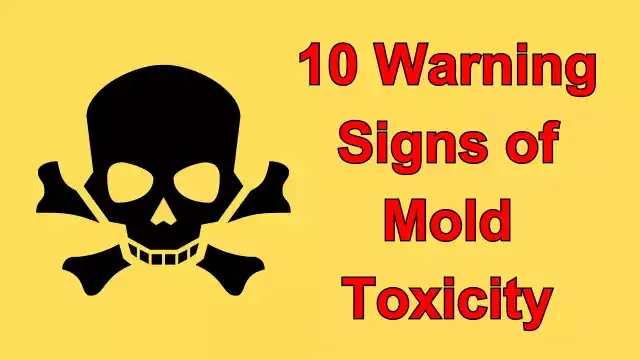10 Warning Signs of Mold Toxicity
Mold is a common type of fungus that grows in damp and humid conditions. While some types of mold are harmless, others can produce toxins that can have detrimental effects on our health.
Mold toxicity occurs when these toxins are inhaled or ingested and can lead to various symptoms and health problems.
In this article, we will discuss the 10 warning signs of mold toxicity and what to do if you suspect you are being affected by mold.
 |
| 10 Warning Signs of Mold Toxicity |
📘Table of Contents:
What is mold toxicity?
Mold toxicity, also known as mold illness or mycotoxicosis, is the term used to describe the harmful effects of exposure to mold and its toxins. When mold spores are inhaled or ingested, they can cause a range of health problems in some individuals. These health problems can vary depending on the type and quantity of mold present, as well as the individual's sensitivity to mold toxins.
10 Warning signs of mold toxicity
Allergies and Respiratory Issues
Mold toxicity can cause or exacerbate allergies and respiratory problems, such as coughing, wheezing, sneezing, and shortness of breath. It can also lead to chronic sinus infections and asthma-like symptoms.
Skin Problems
Some individuals may experience skin rashes, hives, or itchy patches on their skin after exposure to mold.
Fatigue and Weakness
It can lead to chronic fatigue, lack of energy, and feelings of weakness.
Brain Fog and Memory Issues
Many people with mold toxicity experience difficulty concentrating, memory problems, and a feeling of being mentally "foggy."
Headaches and Dizziness
It can trigger frequent headaches and dizziness in some individuals.
Sinus Problems and Congestion
It can cause persistent sinus problems, including congestion, post-nasal drip, and sinus infections.
Digestive Issues
Gastrointestinal symptoms like nausea, diarrhea, and abdominal pain can be present in cases of mold toxicity.
Increased Sensitivity to Odors
Individuals with mold toxicity may become hypersensitive to smells and strong odors.
Mood Swings and Depression
Mold exposure has been linked to mood swings, irritability, anxiety, and even depression in some cases.
Recurring Infections
It can weaken the immune system, making individuals more susceptible to recurring infections, such as fungal infections or respiratory infections.
READ ALSO: Warning signs that your body is full of toxins
Steps to take if you suspect mold toxicity
- See a healthcare professional: Consult with a medical professional who is knowledgeable about mold toxicity and its effects on health.
- Remove yourself from the mold exposure: Identify and eliminate the source of the mold, whether it is within your home or workplace.
- Clean and remediate affected areas: Properly clean and remediate any areas affected by mold growth.
- Support your immune system: Focus on strengthening your immune system through a healthy diet, adequate rest, stress management, and supplements if recommended by a healthcare professional.
Conclusion
Mold toxicity can have a significant impact on one's health if not addressed promptly and effectively. Being aware of the warning signs can help you identify and take appropriate action if you suspect mold exposure.
To protect your health and well-being, seek medical advice and take steps to keep yourself away from moldy environments.
READ MORE:
👉 Signs of high cholesterol on face
👉 10 Signs of liver detox working properly
👉 10 Clear signs that pancreatic cancer has spread
👉 What are 5 signs that you have stopped growing in height?
Frequently Asked Questions
What does mold toxicity feel like?
Cough, wheezing, shortness of breath, headache, fatigue and allergic reactions.
Do you recover from mold toxicity?
Yes, some individuals can recover from it, especially with prompt treatment and removal of exposure. However, individual recovery may vary.
What are symptoms of high mold count?
Nasal congestion, sneezing, cough, itchy or watery eyes, difficulty breathing, and exacerbation of asthma or allergic conditions.





